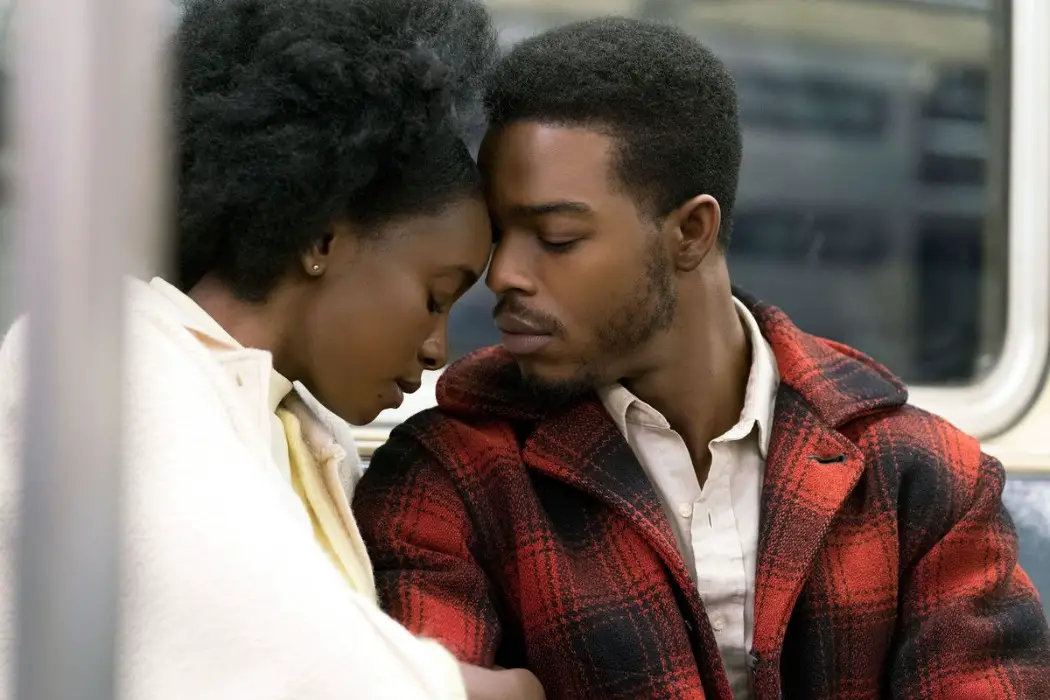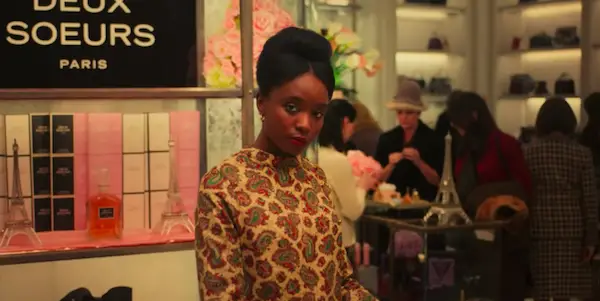IF BEALE STREET COULD TALK: Thematically Complex, Beautifully Shot, Impressively Acted

Christina Tucker is a NY-based production assistant and wannabe screenwriter.
Expectations were high for Barry Jenkins’ third feature and follow up to his critically acclaimed Best Picture winner Moonlight. With If Beale Street Could Talk, Jenkins has again shown himself to be a filmmaker committed to character, performance, aesthetic cohesion, and layered explorations of varied themes.
Adapted from James Baldwin’s 1974 novel of the same name, If Beale Street Could Talk follows a young African-American woman, Clementine “Tish” Rivers (Kiki Layne) who is desperate to clear the name of her partner, Alonzo “Fonny” Hunt (Stephen James), who has been falsely accused of rape, before the birth of their child.
Beale Street depicts a love story with both historicity and universality. Timeless themes of trauma, sin, justice, love, hope, and guilt permeate the film, and are treated with the reverence of a play or poem; every scene is shot, directed, designed, and costumed to a level of cohesion that feels staged and deliberate in the best way. Every triumph and setback experienced by Tish and Fonny feels impactful, symbolic, and is given emotional weight, and more importantly earns this emotional weight through an unwavering commitment to the characters’ experiences, emotions, and the actors’ performances.
The film balances the universality of its themes and the romance and poetry present in the languid pace and cinematographic choices that makes the film feel like a fairytale, while also grounding itself in a specific setting in American history, without becoming a pretentious or trite period piece.

Beale Street’s leads carry the film beautifully. Kiki Layne, with her halo of natural hair, soft voice, and expressive eyes, is sweet and strong-willed even in her moments of sensitivity and naïveté. Stephen James also gives a beautiful performance as Alonzo, known throughout as “Fonny,” succeeding in moments of strength, sensuality, frustration and sensitivity, a capable but emotionally varied craftsman, artist, maker and doer, eager to create a safe, happy future for his new family. These characters are complex despite their overwhelming youthfulness, and the couples’ chemistry and vibrance absolutely sings in every scene.
Beale Street is a balancing act; between universality and historicity, fairytales and realism. It makes no simple choices but rather layers its themes and choices, encouraging exploration rather than simple conclusions. Gorgeous aesthetic decisions amplify strong performances, which come together with technically impressive, emotionally effective results.
“I dig people who love each other.”:
On top of a strong emotional core provided by Layne and James, this film is full of strong performances in its supporting cast. There are no small parts – Brian Tyree Henry, Emily Rios, Pedro Pascal – everyone is allowed emotional complexity, often conveyed with very little screen time. Standouts are Colman Domingo as Tish’s father Joseph and Regina King as Tish’s mother Sharon – in one of the most critically acclaimed performances of the year, King is restrained, desperately holding back signs of frustration and fear as she tries to instill hope in her daughter.

Beale Street has sympathy for its characters that heightens what could have been a simpler story. There is sympathy for the woman who falsely accused Fonny but is nonetheless a woman dealing with sexual trauma, sympathy for Fonny’s brutally judgmental mother and sisters who are hateful out of frustration with Fonny’s squandered potential. Beale Street shows sympathy and respect to its women in particular, who are all shown to be navigating a difficult world in the best way they know how.
James Laxton’s cinematography relishes in the actors’ expressions, their emotions, and their beauty. Several scenes are peppered with what are essentially portraits, unwavering close-ups in which actors look into the camera, watching at the viewer with starling openness, daring us not to connect with them. Laxton also served as DP on Moonlight and is a long-time collaborator of Jenkins, and the two clearly have a filmic language that is devoted to this kind of connection, not only between characters but between actor and viewer.
Beale Street is in no rush – takes and scenes run long as the camera wanders from face to face in moments of conversation or watches characters patiently in their quiet contemplation. There is nothing to distract from the personal and interpersonal stakes; the emotional tone of every scene is the focus. Flashbacks are presented with a sense of respect for love, most importantly the rosy, glossy way it feels for the people in it, and the profound meaning a moment has for Fonny and Tish within the narrative of their lives. Something as simple as Tish and Fonny finding a loft, or Fonny reuniting with an old friend, is triumphant and joyful, filmed in a way that emits an unbelievable warmth; this film loves love, and loves its characters and its actors, and treats them with attentiveness, and thus wills the viewer to do the same.
“I’ll be home soon.”
Beale Street’s 1970s Harlem is one not overly inundated with period-specific references, one that largely keeps the film from veering into the territory of period pieces bogged down by their own historical aesthetics. Still, the costuming reflects the film’s desire for and grappling with romanticism, and color coordination of both costumes and sets adds to the fairytale, theatrical feeling present in many scenes; the first scene in which we see Fonny and Tish their outfits are charmingly coordinated, which sets the tone, visually, for the rest of the film.

The use of music in the film coheres with the film’s nostalgic, dream-like feeling as well. Nicholas Britell, who also composed Moonlight’s gorgeous score, has created a score with notes of classical and jazz that conveys the bittersweet feeling of looking back on sweeter, simpler times, a feeling that, throughout the film, helps maintain Tish’s hope for the future. The soundtrack also avoids the overuse of period-specific songs; while there are period-specific pieces peppered throughout, they are used sparingly and in general diegetically.
One point in which the film does unfortunately become somewhat heavy handed is in its use of black and white historical photographs depicting poverty and police brutality in 1970s America, accompanied by Tish’s voiceover. The voiceover is a nearly unavoidable presence in literary adaptation, but the photos, presumably used to ground the film more firmly in a specific moment for racial injustice in the United States, feel redundant. The film is effective enough on its own in depicting the racial moment to not need these, albeit rare, primary sources.
Beale Street thankfully avoids dwelling on the specifics of the justice system and Fonny’s court proceedings, exploring just enough to give the film enough of a narrative arc, as well as time sensitivity; Tish is eager to secure Fonny’s release before the birth of their child, a goal that proves to be heartbreakingly impossible due to an ineffective justice system. Courtroom drama is not the dramatic center of the film, but the injustice of the criminal justice system both in the 1970s and today is neither overlooked nor overexplained, and contributes most to the film as an insurmountable obstacle to Tish and Fonny’s relationship as husband and wife, and their life as a family with their new child.
If Beale Street Could Talk: Conclusion
If Beale Street Could Talk is an ode to young love, a tragedy about injustice and social mores, a poetic depiction of the loss of innocence and naïveté inherent with maturation, and much more. It ends on an emotionally ambiguous but quietly hopeful note; love has been proven to endure, to manifest in the existence of a healthy baby boy. But the film also asks questions that cannot be answered, only contemplated: Why must Tish and Fonny’s love endure so much for them to simply survive and exist as a family?
Barry Jenkins has again displayed his attentiveness to every element of film – acting, costuming, set design, sound, cinematography, editing – all these elements relate to the themes he aims to explore, creating a truly cohesive, moving vision of a film. If Beale Street Could Talk is more evidence of the talent and dedication of Barry Jenkins and the artists with whom he continues to collaborate.
While Beale Street is technically a period piece, do its historical elements feel necessary, or could it be set in a contemporary time period and work just as effectively? Does the use of a historical time period enhance the themes or simply add an element of aesthetic interest?
If Beale Street Could Talk was released in the US on December 14th, 2018, and will be released in the UK on February 8. All international release dates are here.
Does content like this matter to you?
Become a Member and support film journalism. Unlock access to all of Film Inquiry`s great articles. Join a community of like-minded readers who are passionate about cinema - get access to our private members Network, give back to independent filmmakers, and more.











